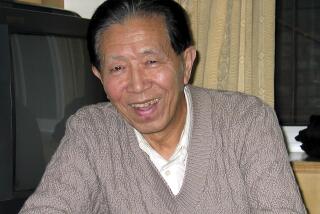Jailed Dissident’s Memoir Details China Justice System
- Share via
A long memoir by the most moderate and tenacious leader of China’s ill-fated democracy movement has been smuggled out of his Peking prison. It details his trial on charges of counterrevolutionary activities and accuses court officials of prejudging him.
Xu Wenli, 42, a railroad electrician who became the editor of the longest-surviving journal of the 1978-80 democracy movement, wrote that his 15-year sentence grew from charges that he had failed to edit out a reference to the “bloody” dictatorship of the proletariat. He also allegedly conspired with foreigners and government critics in Hong Kong and had criticized the 15-year sentence given another, more radical government critic as “too harsh.”
Unlike the charges of other political prisoners, Xu said, “They have not treated me violently.” But he added that early in his detention he was interrogated 200 times, forbidden to read or write, and heard what he thought were “screams of people being struck or electrically shocked.”
He says he waited 17 months for his trial in a small cell with two other prisoners who shared one overcoat and were allowed outside only once or twice a month.
However, he said, “My physical condition is good. I don’t have any fatal diseases.” He also wrote, “I will not kill myself. I will not escape because I am innocent.”
A copy of the manuscript was provided by James Fan, a member of the staff of the New York-based Chinese-language magazine China Spring, which promotes political and economic change in China.
In the manuscript, dated Dec. 12, 1984, Xu (whose name is pronounced somewhat like “shoe”) indicated that he expects to be released by 1989, despite his long sentence. He appears to have retained the same hopeful, moderate view of dissent in China that made him stand out among the critics who blossomed during the days when new posters appeared daily on Peking’s Democracy Wall.
Xu called in the paper for reform but did not reject the Communist Party wholesale. He said his imprisonment results from an official desire to stifle even mild public dissent outside party channels. Referring to China’s top political leader, Deng Xiaoping, he wrote, “Deng makes the same errors as (the late Communist Party Chairman) Mao (Tse-tung).”
Xu said that shortly before his trial, the chief judge visited him and advised him to confess all his crimes in order to get a lighter sentence. At one point during the trial itself, Xu recalled this crucial exchange:
Judge (holding a copy of Xu’s 1980 “Study Memoranda”): It says here that the dictatorship of the proletariat is a “bloody dictatorship.” Is that correct?
Xu: No, I have no such impression.
Instead, Xu argued, the passage was taken out of context: The writer was only criticizing a certain point of view--not actual government policy--that landlords and the bourgeoisie should be violently suppressed because they suppressed workers and peasants before the revolution that brought the Communists to power in 1949.
Xu indicated that his jailers at the Peking No. 1 Municipal Prison allow him to write and to have occasional contacts with guards and other prisoners, the only indication of how he could have prepared and dispatched such a large manuscript.
“Someone who is with the Public Security Bureau is very sympathetic with us and helped us” smuggle out the manuscript, he said. The handwriting of the manuscript appears identical to that of articles Xu distributed in Peking in 1979 and 1980.
Fan, the overseas Chinese journalist noted that Xu--perhaps because of his relatively moderate views--appears to have avoided forced heavy labor in prison.
Xu does complain in the memoir of a back problem and speaks of exercising to keep fit, but mentions no other physical ailments. Other reports, not confirmed in the manuscript, indicate that he has recently been allowed visits by his wife and daughter.
More to Read
Sign up for Essential California
The most important California stories and recommendations in your inbox every morning.
You may occasionally receive promotional content from the Los Angeles Times.













